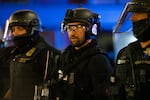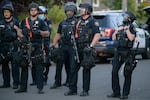At least three Portland police officers under investigation for incidents during last summer’s historic racial justice protests, won’t face criminal prosecution, the Multnomah County District Attorney’s Office announced Friday.
Prosecutor’s memos reviewed by OPB note the district attorney’s office had 21 cases under review that alleged police used excessive force and also took people’s personal property during protests. On Friday, the district attorney’s office said it would close 12 of those cases, either because attorneys and victims didn’t cooperate, the officers couldn’t be identified or the district attorney’s office found no crime was committed.
“The law is on a police officer’s side in doing their job, they can use force,” Multnomah County District Attorney Mike Schmidt told OPB in an interview. “So for us, the analysis is: Is the use of force not allowed by law? Is it so excessive that we could prove beyond a reasonable doubt that they are not allowed to use that amount of force?”
Schmidt decided that he likely could not make that case in court for the cases he closed.
The Portland police officers who were under criminal investigation included Brent Taylor, Thomas Clark and Stephen Perry. Taylor and Clark faced allegations of assault. Perry was accused of taking a protester’s guitar, which detectives later recovered in PPB’s property room and returned. All three incidents the officers were under investigation for took place in August 2020.

Officer Brent Taylor holds an FN303 less lethal launcher while dispersing a crowd of protesters on August 12, 2020 in downtown Portland. Taylor had been under investigation for incidents during last summer’s historic racial justice protests, but won’t face criminal prosecution, Multnomah County's district attorney said on Friday, Sept. 3, 2021.
Jonathan Levinson / Jonathan Levinson
Prosecutors searched social media and civil lawsuits in order to find the use of force incidents that might rise to the level of criminal misconduct.
“The Multnomah County District Attorney’s Office became aware of some of those incidents through complaints received directly, civil lawsuits filed against the city of Portland, social media posts, circulating videos, and referrals from plaintiff’s attorneys,” the memo states.
Eight of the cases were closed because the victims did not want to participate in the investigation or because their attorneys didn’t respond to the DA’s office. Participating in a criminal investigation can often help the city and hurt the victim, explains Jason Kafoury, who represents three of the people involved in the criminal investigation and who are also pursuing civil suits against the city.

Police deploy tear gas during demonstrations in downtown Portland, Ore., Saturday, May 30, 2020. The death of George Floyd at the hands of a white Minneapolis police officer sparked nationwide protests against police brutality amid the COVID-19 pandemic.
Jonathan Levinson / OPB
“I generally don’t provide interviews because I don’t get to interview the cops,” Kafoury said. “It’s basically a one-way discovery that then becomes public record.”
Kafoury said that while he believes Schmidt is a serious prosecutor who is willing to bring charges against police officers, investigations by police into officer actions rarely result in criminal charges.
The dropped cases represent a tiny fraction of the police violence captured on video and shared online last summer, which shocked the city’s conscience night after night.
In one particularly violent video posted online, Clark is seen running after Tyler Cox, an Oregon Health and Sciences University ICU nurse who was at a protest as a medic on Aug. 31, 2020. Clark has expertise in hand-to-hand combat, having studied jiu-jitsu, mixed martial arts and Taekwondo. In the video, Clark grabs Cox from behind and throws him to the ground. As Clark gets on top of Cox, the video shows Cox raise his hands and knock Clark’s helmet off. Cox said he was protecting himself. Clark, the officer, said it was intentional. Clark proceeds to hold Cox down and punch him multiple times. But it was Cox who was charged with assaulting a public safety officer, a felony, and three misdemeanors including resisting arrest and disorderly conduct. Schmidt also dropped those charges.
“This is an extremely disappointing decision,” said Joe Piucci, Cox’s attorney. “How they get there is what’s truly perplexing because you can see with your own eyes what happened, and it was a violent arrest. It was an unnecessary arrest and it was an arrest that should be criminal. If you weren’t a cop you couldn’t get away with that.”
A police officer runs ahead of his line, tackles a protester, and starts punching them on the ground pic.twitter.com/gpwmMjwuWC
— Sergio Olmos (@MrOlmos) September 1, 2020
In the two memos explaining the charging decisions, Deputy District Attorney Nicole Hermann lays out the various state laws governing the use of force and how they apply to the 12 closed cases.
“Generally, state law provides protections from criminal liability to peace officers when using force to effectuate an arrest or in self-defense, actions that are part of their sworn and authorized duty to the public,” Hermann’s Aug. 13 memo explains.
State law authorizes an officer to use only the amount of force they believe is necessary to make an arrest, prevent an escape from custody, or to prevent physical injury. Those laws overwhelmingly rely on an individual officer’s assessment of the situation unfolding in front of them. The law requires prosecutors to prove that the officer’s decisions were not reasonable given what they knew at the time.
It’s a high bar, according to the district attorney’s office.
“We are evaluating it from the officer’s perspective,” Schmidt said about Clark’s use of force against Cox. “What we would have to prove in court is that his perception of what was going on is completely inaccurate and that what he was doing was not justified.”
Schmidt said his prosecutors likely couldn’t prove in court that Clark’s actions were criminal.
In other cases reviewed for possible charges, prosecutors found Taylor was justified in his use of force against Erica Christiansen. Hermann’s memo said Christiansen flicked a cigarette at Officer Lino Pavon, and in response, Taylor pushed her back. After she kept advancing toward the officer, Taylor fired three less lethal munitions at her.
A civil lawsuit Christiansen filed against the city tells a very different version of events. In a description posted online, Christiansen’s attorney said she was not participating in the protest, but she and other neighbors yelled at police to leave their neighborhood during a protest in Northeast Portland on Aug. 9. The civil lawsuit notes a Portland police officer “pushed her to the ground, and with intent to cause her harm, shot her at point-blank range five times with penetrating plastic buck shots as he stood over her.”
The district attorney’s office found Taylor’s use of force “was in response to a reasonable assessment that Christiansen would continue to use force against Officer Pavon and was a reasonable and necessary degree of force.”
Kafoury, who represents Christiansen, said he has not been able to view the evidence they have and can’t explain the discrepancy.
“I don’t have any of the underlying documents they’re relying on or the videos,” he said. “I’m in the dark. That’s not the account that my client or the witnesses that I’ve interviewed gave.”

The Multnomah County District Attorneys Office is considering charges against another Portland Police Bureau Officer Thomas Clark, center with mask, stemming from last summer's protests.
Courtesy of Doug Brown
Friday’s announcement follows an indictment of Portland Police Officer Corey Budworth, who was charged by a grand jury with a misdemeanor assault charge in June for hitting a protester multiple times from behind and after she was knocked down to the ground.
At least 191 protesters have been charged and prosecuted by Schmidt’s office. Meanwhile, Budworth was the second criminal case filed against an officer in connection with last summer’s protests. The other was an assault, official misconduct, and failing to perform the duties of a driver charge against retired officer Scott Groshong after he nearly hit a protester with a van. The U.S. Department of Justice and community policing groups have insisted more should be done to seek officer accountability after PPB violated its own use of force policies on multiple occasions last summer.
While dozens of protesters have faced criminal prosecution in state court, Portland appears to have disregarded a Justice Department recommendation to hold lieutenants and higher-ranking officers accountable for last summer’s use of force violations. Federal prosecutors singled out then-Cmd. Brian Ossenkop for having signed off on a use of force incident that violated bureau policy. Rather than follow DOJ recommendations, the city instead promoted Ossenkop to assistant chief of operations Thursday.
Of the remaining eight open cases discussed in Hermann’s memo, four involve Det. Erik Kammerer, known among protesters as “Officer 67” after the number on his helmet while deployed with the Rapid Response Team. That team disbanded when officers resigned en masse following Budworth’s indictment. Because homicide detectives work closely with the district attorney, cases involving Kammerer have been referred to the Oregon Department of Justice. Four other cases remain under investigation and could still yield criminal charges, according to Schmidt.
Prosecuting police officers also have potential political consequences for Schmidt who, although he won his election in a landslide last May, has had a bitter relationship with the police throughout his tenure. Much of the vitriol from the police bureau came after Schmidt declined to bring low-level charges for non-violent crimes at last summer’s protests, such as protesters failing to disperse from an area when ordered by police. During the past year, officers have maligned Schmidt as Antifa, accused him of being backed by billionaire investor George Soros, and leaked his address to a pro-police website, which resulted in death threats that temporarily forced Schmidt and his family to move out of their home.

District Attorney Mike Schmidt at a press conference Aug. 30, 2020, in Portland, Ore. A man was shot and killed the previous night as a Trump car caravan rolled through downtown.
Bradley W. Parks / OPB
In discussing the charging decisions with OPB, Schmidt offered a dispassionate assessment of his decisions, noting politics does not factor into his office’s charging decisions.
“Obviously, some people will look at that and they will be disappointed with this outcome and conclusion,” he said. “But it’s our job to just look at the law and say, ‘Hey, under these circumstances, this is what’s allowable by law.”
Clark’s use of force may have been allowable under the law, but Schmidt wondered if it was necessary.
“The alleged crime which the officer had probable cause to make an arrest for was misdemeanor interference with a peace officer,” Schmidt said. “Is that amount of use of force...necessary to effectuate an arrest on a misdemeanor like that? I think that’s a fair question for the legislature to consider.”
Police reform has been among the highest-profile issues Oregon lawmakers have made since George Floyd’s murder by a police officer in Minneapolis.
Last year, state lawmakers passed House Bill 4301, which among other modifications, requires officers, when possible, to give a verbal warning and an opportunity for a person to comply before using force.
Schmidt said even with that new legislation, the law, and how force is used, is still on the officer’s side.
“An officer absolutely can use force in effectuating an arrest for a misdemeanor,” Schmidt said.
Earlier this year, lawmakers revised the state’s interfering with a peace officer statute to explicitly say it does not apply to passive resistance. Had Cox run from Clark during a protest after Jun. 11, 2021, he wouldn’t have been committing a misdemeanor and Clark wouldn’t have had probable cause to arrest him.
Correction: This story initially misstated the number of cases closed. OPB regrets the error.